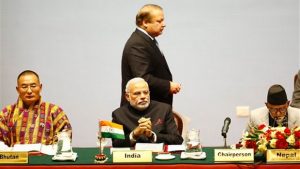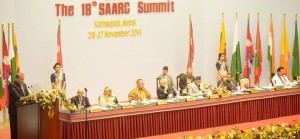More often than not, questions have been raised about the utility and necessity of SAARC. India has a variety of disputes with all its immediate neighbours and it is in no mood to resolve these matters. Moreover, India views SAARC as an instrument of establishing and consolidating its hegemony in the region; other members of the organization resent this approach by India. India’s effort to scuttles China’s membership to SAARC, during the recent summit, indicates Indian intent to perpetuate its monopoly over SAARC.
Recent summit was also beset by oozing tension between Pakistan and India. Nevertheless, last moment handshake between the Prime Ministers of Pakistan and India gave SAARC another lease of life, till next summit. Turning this brief interaction into diplomatic reality is not going to be easy. Indian attitude of blaming Pakistan for everything that may have or could go wrong in India, especially maligning military and ISI has bred a sickening mindset that has bedevilled some very robust peace initiatives from various quarters to strengthen bilateral relations. False flag operations by Indian intelligence agencies are being increasingly attributed to ISI. However, there have been credible voices, from within India that have spoken the truth about such malicious operations; but by then short term objectives had already been achieved and absorbed by India; and such confessions hardly had any practical value; nevertheless whistle blowers did set the record straight.
Both, Pakistan and India suffer from chronic shortages of electricity, hindering development in economic and social sectors. Signing of an electricity grid sharing agreement is likely to improve cross-border energy trade. At the same time, failure to sign the pacts on road and rail connectivity is an indicator of the limitations of SAARC, as well as intensity of mistrust on various counts. Apparently, these inhibiting factors are likely to continue for an indefinite time.
Back in 2002, President Musharraf after delivering his speech at the SAARC summit, proceeded to Indian Premier Atal Bihari Vajpayee, and engaged him in a memorable handshake.That happened despite the fact that before leaving for that summit, Vajpayee had asserted that there was no chance of any interaction with the Pakistani president on the sidelines. But when Musharraf forwarded his hand to Vajpayee, he was left with no other option than to respond positively.  And now Prime Ministers Nawaz Sharif and Narendra Modi shook hands at the closing ceremony of the summit to the delight of the gathering. When Nawaz and Modi moved towards each other for a handshake, at the instance of Nepal’s Prime Minister Sushil Koirala, the audience greeted them with applause.Television showed the two men smiling and exchanging a few words.”Both are talking in a friendly manner,” Nepalese Prime Minister told reporters. The relief on the faces of the host Sushil Koirala, other leaders and delegates was conspicuous as they clapped when Nawaz and Modi vigorously shook hands. Except for these brief exchanges, the two leaders had spent most of the summit cold-shouldering each other. Whether by a uniformed president or a civilian premier, one has to accept that Pakistan has never shied away from offering friendship to India. It has done so several times in the past and even this time; it has welcomed the resumption of dialogue more eagerly than India. India, on the other hand, suspends dialogue whenever a breakthrough is in sight.
And now Prime Ministers Nawaz Sharif and Narendra Modi shook hands at the closing ceremony of the summit to the delight of the gathering. When Nawaz and Modi moved towards each other for a handshake, at the instance of Nepal’s Prime Minister Sushil Koirala, the audience greeted them with applause.Television showed the two men smiling and exchanging a few words.”Both are talking in a friendly manner,” Nepalese Prime Minister told reporters. The relief on the faces of the host Sushil Koirala, other leaders and delegates was conspicuous as they clapped when Nawaz and Modi vigorously shook hands. Except for these brief exchanges, the two leaders had spent most of the summit cold-shouldering each other. Whether by a uniformed president or a civilian premier, one has to accept that Pakistan has never shied away from offering friendship to India. It has done so several times in the past and even this time; it has welcomed the resumption of dialogue more eagerly than India. India, on the other hand, suspends dialogue whenever a breakthrough is in sight.
While addressing the summit, Prime Minister Nawaz called for dispute-free South Asia: “My vision for South Asia is to have a dispute-free region”.  He emphasized that the region which was home to a quarter of the world’s population was mired in poverty, disease and illiteracy, and had the lowest human and social indicators. “The region only accounts for 6 per cent of the world’s GDP in purchasing power parity and is one of the least integrated regions in the world,” he said. Committed to address the issues faced by the region and resolving them, the premier said that the people should be central to the SAARC processes. He added that the region should build upon its inherent strengths in order to effectively address common issues like socio-economic disparity. Nawaz further said, “(it) would require close coordination at national and regional levels and greater collaboration in all sectors of development”. Touching on the recent monsoon floods in South Asian countries, Nawaz said that “natural disasters affect everyone, regardless of national boundaries and economic status…We must develop bonds of trust to resolve our problems”.
He emphasized that the region which was home to a quarter of the world’s population was mired in poverty, disease and illiteracy, and had the lowest human and social indicators. “The region only accounts for 6 per cent of the world’s GDP in purchasing power parity and is one of the least integrated regions in the world,” he said. Committed to address the issues faced by the region and resolving them, the premier said that the people should be central to the SAARC processes. He added that the region should build upon its inherent strengths in order to effectively address common issues like socio-economic disparity. Nawaz further said, “(it) would require close coordination at national and regional levels and greater collaboration in all sectors of development”. Touching on the recent monsoon floods in South Asian countries, Nawaz said that “natural disasters affect everyone, regardless of national boundaries and economic status…We must develop bonds of trust to resolve our problems”.
While addressing the summit, President Ashraf Ghani said he would not allow anyone to conduct a proxy war in his country or Afghan territory to be used against its neighbours. “We will not allow our territory to be used against any of our neighbours. His speech came after warnings that the rivalry between India and Pakistan could spill across Afghan border.
Prime Minister Modi insisted that his vision for India and the region were identical.”Nowhere are collective efforts more important than in South Asia and nowhere else it is more moderate,” he said. Modi pledged to assist funding for infrastructure in the region, streamline custom duties at borders, provide 3-5 year business visas to investors and implement a travellers’ card. Immediate medical visa was also assured along with funds to set up a laboratory to combat tuberculosis in the region. He also pledged to release vaccines to rid SAARC of polio. All leaders appealed for cross border cooperation in liberalizing trade and fighting climate change, which is affecting all member states.
South Asian leaders regretted that SAARC, despite its nearly three-decade existence, had failed to live up to the expectations. SAARC was initially founded with the goal of moving towards a European-style union. However, despite a free trade pact, in force since 2006, high tariffs and curbs on movement limit trade among South Asian nations to just five percent of their total trade. “Despite several transformative potentials in the region, our achievement stands short of expectations…We alone are responsible for shortcomings in the SAAR process,” said Sushil Koirala.
A 31-point document titled the “Kathmandu Declaration” was issued at the end of the summit. It touches on a wide range of issues including counterterrorism, trade and investment promotion, infrastructure development, youth employment, telecommunication tariff cuts, regional connectivity, social security for elderly people, literacy, and SAARC transformation into the South Asian Economic Union by 2030. Aiming to transform the region into a vibrant economic zone, SAARC leaders resolved to set up a South Asian Economic Union on the lines of European Union by facilitating a common market and removing trade barriers—easier said than done.
While talking to journalists, Prime Minister Nawaz said that Pakistan is ready for dialogue, but India would have to take the first step. And given how India suspended foreign secretary level talks, Nawaz is right in his stance. Pakistan wants ties with India on the basis of dignity, self-respect and honour and desires a meaningful dialogue to resolve all issues including the Kashmir dispute. The world community realises that Kashmir is a dispute endangering peace in South Asia. Therefore, no progress towards normalisation of bilateral relations with India is possible without making meaningful advancement to resolve Kashmir issue. And until bilateral conflicts amongst the member state are resolved, SAARC will continue to wander like a rudderless ship.
The Frontier Post, December 12, 2014
Disclaimer: Views expressed are of the writer and are not necessarily reflective of IPRI policy.
